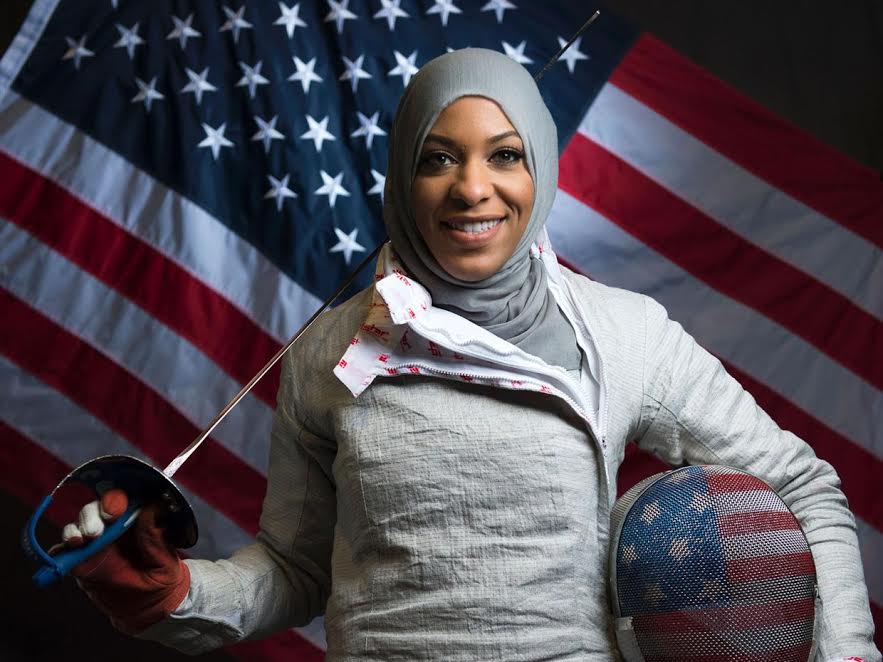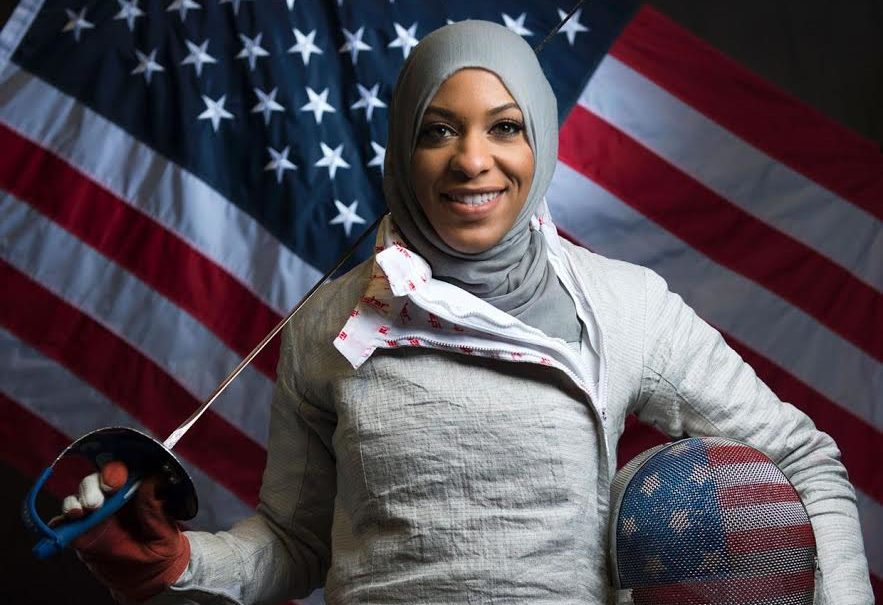Ibtihaj Muhammad is an United States Olympic fencer who competed in the 2016 Rio Olympic Games and brought  home a bronze medal as a part of the American sabre team. She is the first female American Muslim athlete to bring home an Olympic medal and has been named as one of TIME’s 100 Most Influential People.
home a bronze medal as a part of the American sabre team. She is the first female American Muslim athlete to bring home an Olympic medal and has been named as one of TIME’s 100 Most Influential People.
When asked about what led her to pursue fencing as a sport, Ibtihaj said, “With the hijab, I cover everything with the exception of my face and my hands. [For] all of the different sports that I played as a kid, my parents had to alter the uniforms for me to adhere to the tenants of my faith. My parents were looking for a sport for me to play where I could be fully covered as a Muslim youth. When I was 12 years old, my mom happened to see fencing at the local high school. We weren’t particularly familiar with the sport at the time, but since the uniform had a jacket and long pants, my mom wanted me to try it out.”
At the age of 13, Ibtihaj began to fencing without even dreaming about being on the Olympic team. When asked about the adversities she faced as a Muslim woman of color pursuing fencing, she said, “I started fencing a little bit later than a lot of my teammates on the elite level. My first senior competition [was when] I was 23, whereas a lot of my teammates had those experiences when they were 17 or 18 years old. A lot of people didn’t believe that it was possible for me to do it from just an age standpoint. I was constantly challenging the norm and fought for what was possible for me as a Muslim woman of color.”
In the athletic world, people will often agree that athletes are able to shed all differences and unify with a common love for sport. With respect to this topic, Ibtihaj said, “What drew me to fencing was not just being able to wear the long sleeves and long pants in the competition. It was also about being able to put on a fencing mask and people not judging [me] for my religious identity or my skin color. I think it was important for me to have a sport that was totally about the athletic ability. When we think about sport, I would say that it is one of the only things in the world that could unite people and where people find common ground. [It is] where misconceptions or the perceptions you have about people and their identity are left at the door. I think that in the athletic community, there is a different culture and that’s the thing I like about sports. It is not about your religious identity or your cultural identity or your ethnicity, it is all about what you can bring to the table as an athlete.”
Ibtihaj has been named a “Pioneer” in the TIME’s List of 100 Most Influential People. One of the reasons why she was given this label is because she is the first American woman to wear the hijab while competing on an Olympic level. When asked about how it felt to receive such recognition, she said, “It’s really an honor to be the first Muslim woman on Team USA, [but] I wish that I wasn’t the first. It would’ve been easier for me as a kid growing up in sports, if there had been someone for me to look to for inspiration to just be myself in the space of athletics. But, at the same time it is such an honor and a blessing [to be the first American woman to wear the hijab while competing in the Olympics] and I feel like I am able to carry the torch not just for myself, my family, and the Muslim community; but for minorities and for anyone who has ever felt that someone didn’t believe in them, their journey, or their story. Even [for those who] felt like they didn’t belong in a particular space.”
When asked about what advice she would give to girls interested in pursuing an Olympic sport, Ibtihaj said, “My Olympic journey never felt like an Olympic journey, it felt like a journey through sport and that so happened to end at the Olympics. But, if I were talking to someone who says, ‘I want to get to an Olympic level sport, what do I do?’ I would say to start off small and set small goals for yourself and be willing to work hard. I know that there were so many times in my life where I was told that I wouldn’t be successful in sport or that it wouldn’t happen for me since I wasn’t good enough. I never relied on other people’s affirmations and that’s something my mom instilled in me from when I was young. You can’t rely on other people to dictate how you feel, that’s something that comes from within. I’ve always felt that I could do anything that I wanted to do. Whether that be in the classroom or on the athletic field, I just always really believed in myself. I believe that [self-confidence] shows off the field and on the field. When you’re confident about yourself, how you look, and your abilities, those things shine through. To believe in yourself and your journey, to work hard, and not allow other people to tell you what you can or can’t do.”
Contributor: Keerthi Jayaraman



Comments (0)